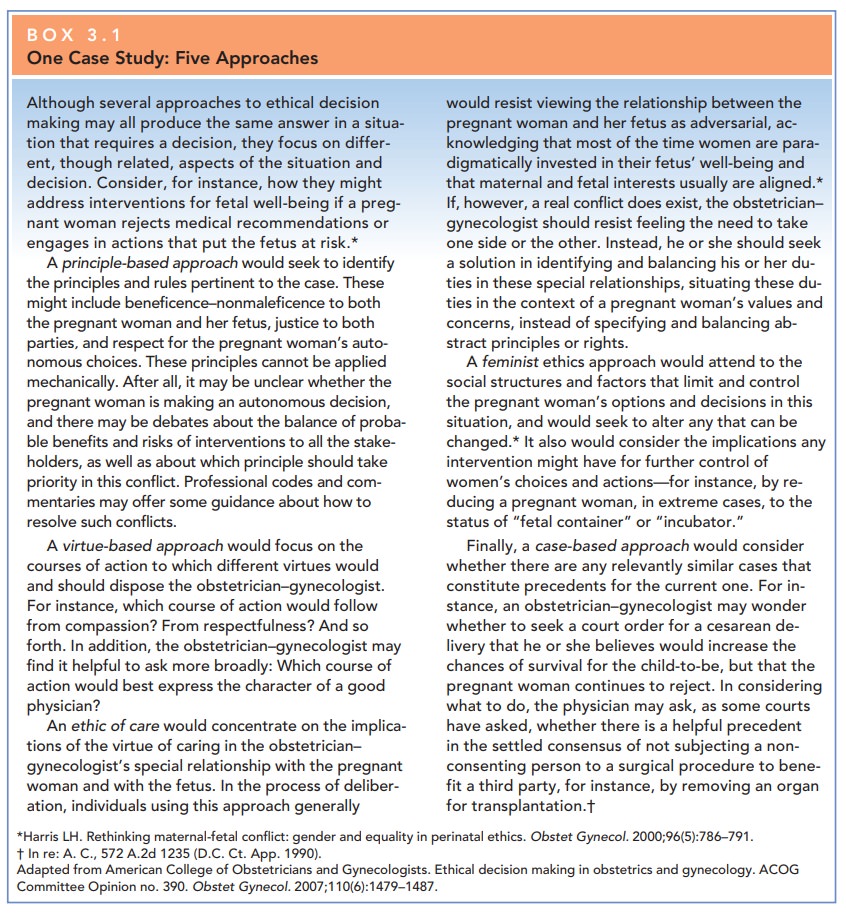Chapter: Obstetrics and Gynecology: Ethics in Obstetrics and Gynecology
Ethical Considerations in Obstetrics and Gynecology
ETHICAL CONSIDERATIONS IN OBSTETRICS AND GYNECOLOGY
Issues surrounding maternal and
fetal rights are uniquely central to obstetrics and gynecology. The primary
con-cern of physicians is to provide the best care to their pa-tients. However,
recent legal actions and policies aimed at protecting the fetus as an entity
separate from the woman have challenged the rights of pregnant women to make
decisions about medical interventions and have criminal-ized maternal behavior
that is believed to be associated with fetal harm or adverse perinatal
outcomes. Threats andincarceration have
been proved to be ineffective in reducing the incidence of alcohol or drug
abuse, and removing children from the home may only subject them to worse risks
in the foster-care system. ACOG and medical ethicists have
consistentlymaintained that the rights of the mother in considerations of
medical care or the therapeutic alliance of physician and patient take
precedence over those of the fetus.
Conflicts between maternal and
fetal rights arise when a pregnant woman engages in behaviors, such as il-licit
drug use, that may put her fetus at risk. According
to theprinciple of autonomy, obstetrician–gynecologists are obligated to
respect the mother’s prerogative to make choices and take action based on her
beliefs or values, even if these choices and actions are harmful to herself and
her child. However, thephysician is also obligated under the principle of
benefi-cence to promote the well-being of others. In situations in which a
pregnant woman is putting her fetus at risk through harmful behaviors, the
obstetrician–gynecologist should provide accurate and clear information
regarding the consequences of the harmful behaviors. The patient should also be
referred to an appropriate treatment pro-gram. Treatment is both more effective
and less expensive than restrictive policies.
The ethical principle of justice
governs access to care and fair distribution of resources. Therefore,
implementa-tion of universal screening for risky behaviors is an impor-tant
step in equalizing access to care and in assessing the resources that are
needed for particular patients. Psycho-social screening of all women seeking
pregnancy evalu-ation or prenatal care should be performed regardless of social
status, educational level, or race and ethnicity. Because risks may not be
evident at the first prenatal visit, screen-ing should be repeated at least
once a trimester. There is evidence that women who are screened for
psychosocial is-sues once each trimester are half as likely as women who are
not screened to have a low–birth-weight or preterm baby. Screening consists of
questions designed to elicit in-formation regarding current and past alcohol
and drug use, ability to access prenatal care, and safety at home. Screening
questions are now included in the ACOG Obstetric Medical History form (Appendix
C).
Another maternal–fetal conflict
may arise if a pregnant woman rejects medical advice or interventions that are
nec-essary to avert fetal complications or death. Again, the preg-nant woman’s
autonomous decisions should be respected as long as she is competent to make
informed medical deci-sions. The
obstetrician’s response to a patient’s unwillingness tocooperate with medical
advice should be to convey clearly the rea-sons for the recommendations to the
pregnant woman, examine the barriers to change along with her, and encourage
the develop-ment of health-promoting behavior. When conveying this
in-formation, the obstetrician must keep in mind that medical knowledge has
limitations and medical judgment is fallible. He or she should make every
effort to present a balanced evaluation of expected outcomes for both the woman
and the fetus. Even if a woman’s autonomous decision seems not to promote
beneficence-based obligations (of the woman or the physician) to the fetus, the
obstetrician must respect the patient’s autonomy, continue to care for the
pregnant woman, and not intervene against the patient’s wishes, re-gardless of
the consequences (Box 3.1).

Related Topics